The Best Platforms to Build an Online Marketplace (Magento, Shopify, WooCommerce)

In the following material, we explore the phenomenon of online marketplaces. What are they? What is their background? What is the present and future of online marketplaces? How important is the role of Magento in their establishment? What are the best platforms to build an online marketplace? You will find the answer to these and other questions below.

Table of contents
Online Marketplace Definition
According to the , a marketplace is a site where things are sold. Usually, it is an open area in a town with a market. As everyone knows, this form of commerce exists for ages. But how did it get online, and what common traits do online and offline marketplaces share? Let’s define the latter to put the record straight.
According to , an online marketplace is a particular e-commerce website where multiple third parties offer their products or services – just the same principle that the offline counterpart implements. However, all consumer transactions are processed by the marketplace operator, which distinguishes these two models: offline retailers are responsible for all the processes related to business operations. As for online retailers, they only have to receive, fulfill, and deliver orders. Also, players in both conditions have to pay a fee for access to the marketplace. A “post-selling” fee is charged for online transactions. If you operate offline, it is usually necessary to pay a fixed price for a place where you showcase your goods.
The ability to aggregate products from a wide array of providers enables both online and offline marketplaces to deliver a more comprehensive selection of goods. Thus, the current product availability is higher than in vendor-specific stores and caters to almost all consumers’ needs. At the same time, you can easily discover consumer-specific multi-vendor websites bound to a particular segment.
Let’s name a few criteria that characterize online marketplaces. You can define them according to the following parameters:
- Product Assortment. You may find marketplaces that offer products that fit a particular niche. For instance, offers hand-made goods and accessories as well as vintage items and craft supplies. It means that you will never find a microwave there unless it is turned into a piece of art. At the same time, provides everything from electric car accessories to musical instruments.
- Marketing Strategy. While there are lots of marketing strategies, online marketplaces are usually defined as B2B and B2C. For instance, is a huge B2B marketplace aimed at wholesalers, while is an online retail service owned by the same corporation.
- Tangibility of Sold Items. A marketplace may be focussed on products or services only. An online platform that initiates and coordinates buying and selling of services between seekers and providers is a service marketplace that usually caters to specific niches. Such platforms as are known for their professional writing and design services, while is where child and elderly care providers look for work. Amazon, in its turn, is strictly associated with products.
- Product Conditions. When it comes to products, you usually deal with new or used goods. Thus, some marketplaces, such as , are aimed at vintage items only, while the others work with new products, AliExpress, or offer both new and used assortment, Amazon.
The Best Platforms to Build an Online Marketplace
While it is up to you to decide what business model is more suitable for your online marketplace, we are here to help you select a platform to build your project upon. Let’s define the existing technologies before going any further:
- Open Source. Such solutions as Magento 2 and WooCommerce provide the ability to create an online marketplace on top of an open-source platform. It means that you can implement any customizations you could ever imagine, especially considering the PWA approach the former one offers.
- Extensions. Such systems as Shopify and BigCommerce let you choose an extension to enable the marketplace functionality. This approach is much less flexible since you have to deal with the provided functionalities only. However, you need much less resources to build an online marketplace.
- Standalone SaaS. At the same time, some platforms offer only marketplace functionality. They are much more flexible than extensions but less resource-hungry than open-source platforms. Sharetribe is an excellent example of related technology.
Now, when you are familiar with the core marketplace types and possible technologies behind them, let’s look at the major solutions that let you build multi-vendor websites. We begin with the most robust examples from the first two categories.
Magento 2
![]()
Long before the appearance of , the first version of the platform came out carrying off the bays among other similar solutions. It paved the way for the next generation into the bright future of opportunities, creating a robust foundation for further growth. Due to that, Magento 2 is now the most powerful e-commerce system on the market at the moment. It offers hundreds of features that enable the soundest e-commerce experience in the universe. The availability of two editions – Open Source and Commerce – enables merchants of all sizes to leverage the platform following their specific needs. Its open-source nature, combined with the most extensive ecosystem of third-party extensions, lets merchants create a custom project of any complexity. What about online marketplaces, you will ask?
Magento 2 is entirely suitable for developing an online marketplace. You only need to choose a third-party extension that enables the desired functionality. uMarketplace Suite by Unirgy and Multi Vendor Marketplace by WebKul are currently the most potent and-feature-rich modules that turn Magento 2 into a robust online marketplace.
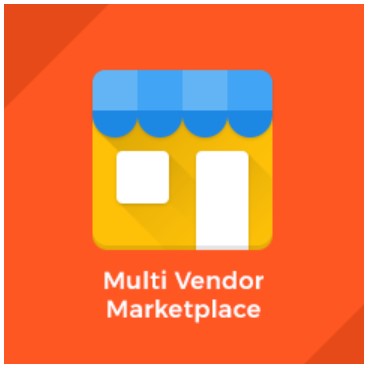
Let’s explore the latter’s functionality to illustrate the possibilities Magento 2 provides in the realm of multi-vendor websites. With Webkul’s Multi Vendor Marketplace module, you can convert a default Magento store into a feature-rich multi-seller website that offers functionalities similar to Amazon, eBay, Etsy, Alibaba, and so on. Let other sellers sign-up and create storefronts based on your marketplace. Provide them with the ability to view stats, add all possible products, fulfill orders, and write the corresponding documentation.
From the perspective of end customers, Webkul’s Multi Vendor Marketplace lets them shop from a vast collection of products sold by various vendors gathered around your online marketplace. Buyers can leave reviews and ratings as well as communicate with sellers directly or by viewing the information they display.
As a Magento 2 administrator, you can configure the module and control all the processes that take place on your Magento 2 marketplace from the backend. For instance, it is possible to set the global commission rate on the seller products, which will be applicable for all vendors. You can also enable/disable store owners to manage orders and taxes. The required seller, product, product update, and order approval may be turned off if necessary. However, we don’t recommend you do that to get more control over what’s going on on your Magento 2 online marketplace. Besides, you can choose the product types allowed for vendors, specify a product SKU prefix.
As a seller on a Magento 2 marketplace, you can visit the storefront and get onboard to start listing your products. Sign up using the marketplace landing page button and specify a unique shop URL. Next, the system will enable you to view your dashboard, edit profile, add/manage products, view transactions, and monitor total earnings. Besides, the notification count for product approval, new order placed, and recent transactions is under your disposal.
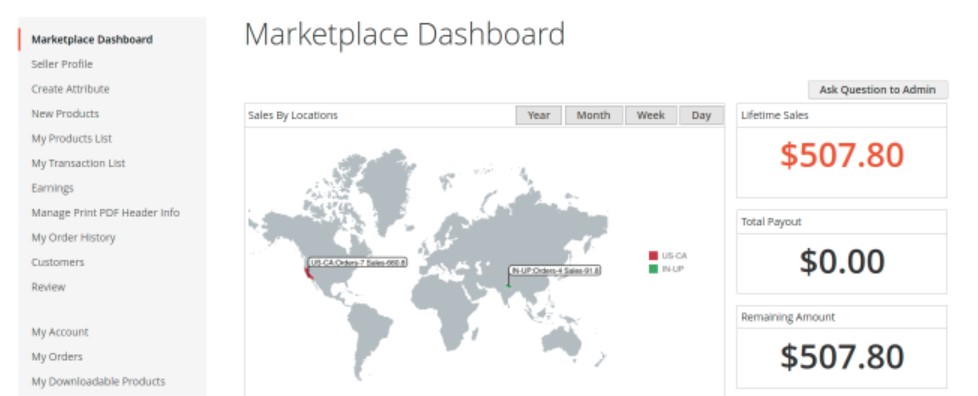
While editing your profile information, you can modify the shop name, location, banner image, logo, etc. Add social media links and contact numbers to let buyers reach you in the most comfortable way. Editing various design parameters to follow your brand identity is possible too.
With the Webkul Multi Vendor Marketplace Magento 2 extension, all sides get specific benefits from participating in the marketplace activities. Thus, you get a commission on every product sold as a store owner. Note that different commissions per seller are possible.
As a vendor, you can boost sales by streamlining many channels. Leverage the multichannel concept as a popular way to reach a broader target audience. Remember that selling on many marketplaces leads to more sales.
From the buyer’s perspective, Magento 2 provides a broader array of options. It means that customers get a selection of similar possibilities and purchase products at the lowest possible prices.
As you can see, Magento 2 offers quite decent opportunities when it comes to an online marketplace. You can choose a module that suits your needs and add more customizations if necessary. What about other platforms?
Shopify

Shopify is another top-rated e-commerce platform. While Magento 2 is primarily aimed at huge market players, Shopify is focussed on smaller clients. Another difference is that the platform offers much less opportunities associated with customization. But you can still run a multi-vendor marketplace on top of a Shopify website with the help of third-party extensions. Below, we highlight several leading solutions.
WebKul, which we’ve just mentioned above, also offers a Multi Vendor Marketplace tool for Shopify. The application converts a regular online Shopify store into a fully-featured marketplace. It enables sellers to process listing and track sales. Besides, they get the ability to add an unlimited number of products to the catalog. Also, note that the number of sellers on the marketplace is unrestricted. Note that compared to Magento 2, the level of customization is way more limited.
Jetti is another solution that offers the ability to create an online marketplace on top of Shopify as well as automate various routine processes that occur in the multi-vendor business model. For instance, the application automatically puts the existing orders into vendors’ stores, lets you pay vendors, and synchronizes inventory updates.
The platform’s advanced multi-warehouse inventory lets you sync inventory, orders, shipping, and payments between your e-commerce website and other stores. You can automate dropship and in-house operations and leverage custom vendor integrations out of the box. You get notifications regarding product updates from suppliers. The ability to manage vendor shipping rules allows for configuring rates and rules per store.
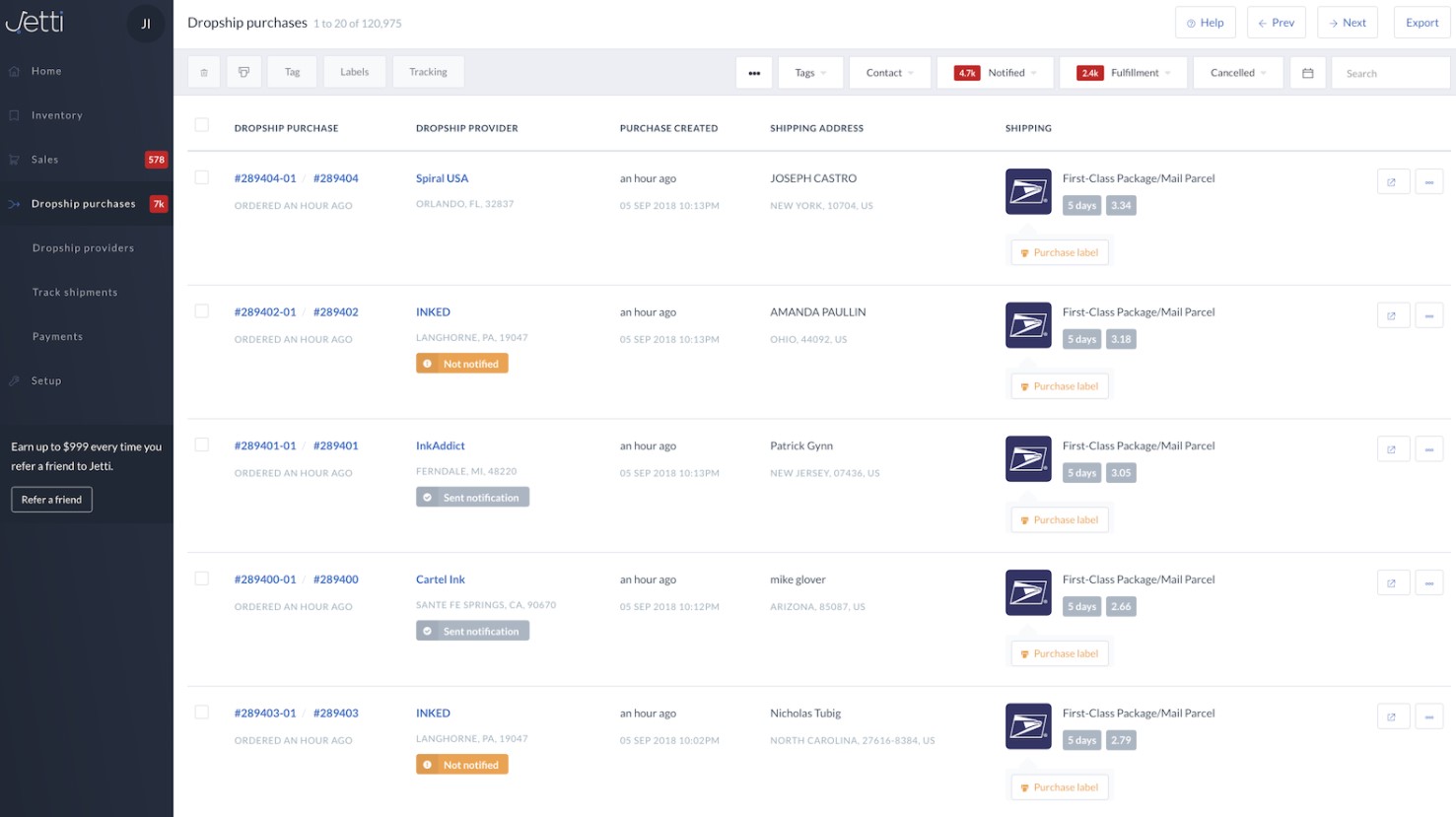
Marketcube.io is also aimed at transforming a regular Shopify store into a fully operational online marketplace. With this app, you get the ability to manage vendor’s accounting, orders, and inventory. Furthermore, most backend processes are automated to enhance the user experience your partners and you get. You can test the core features of the extension due to a FREE plan. It offers the app’s core features so that you can decide whether to choose it or not. Several paid plans with advanced functionalities are under your disposal too. You get the ability to automate marketplace management and provide vendors with ownership but maintain full control over your website.
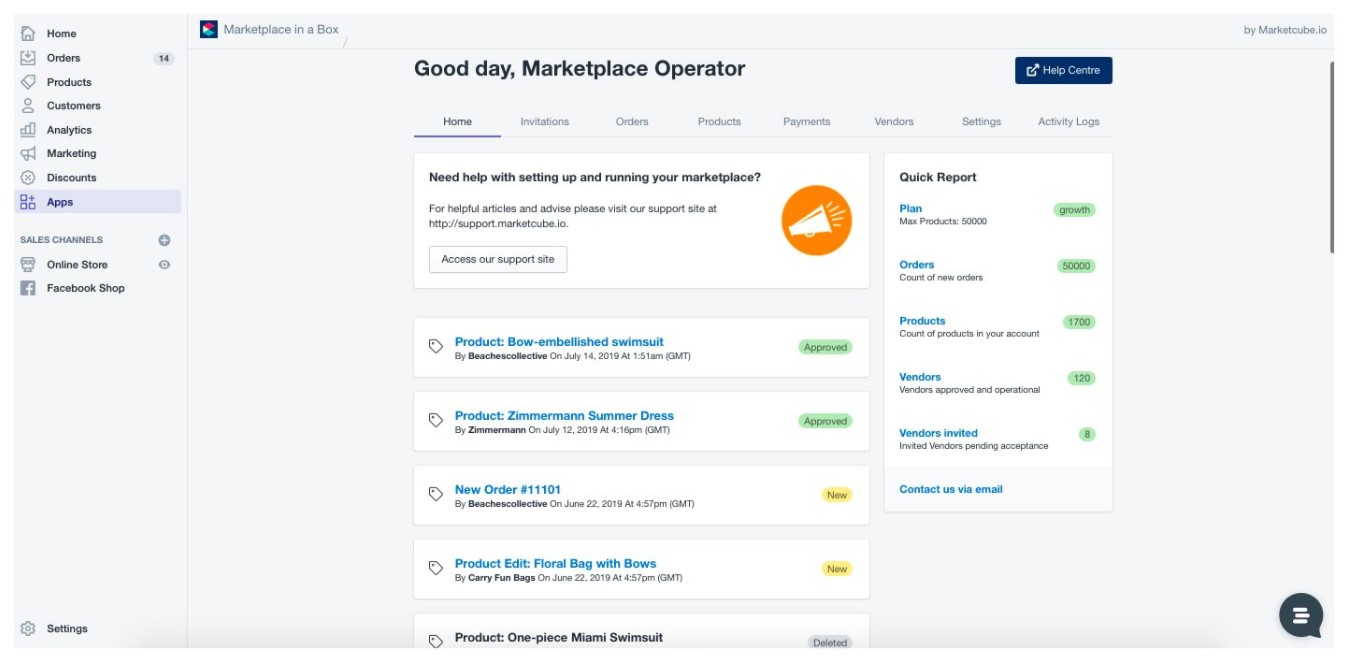
Softpulse Infotech is another extension provider that delivers an app that revamps Shopify’s default functionality to enable the marketplace features: multiple vendors, unlimited products, catalogs per shop, automated approvals, etc. As a marketplace owner, you get total control over what’s going on on your e-commerce website.
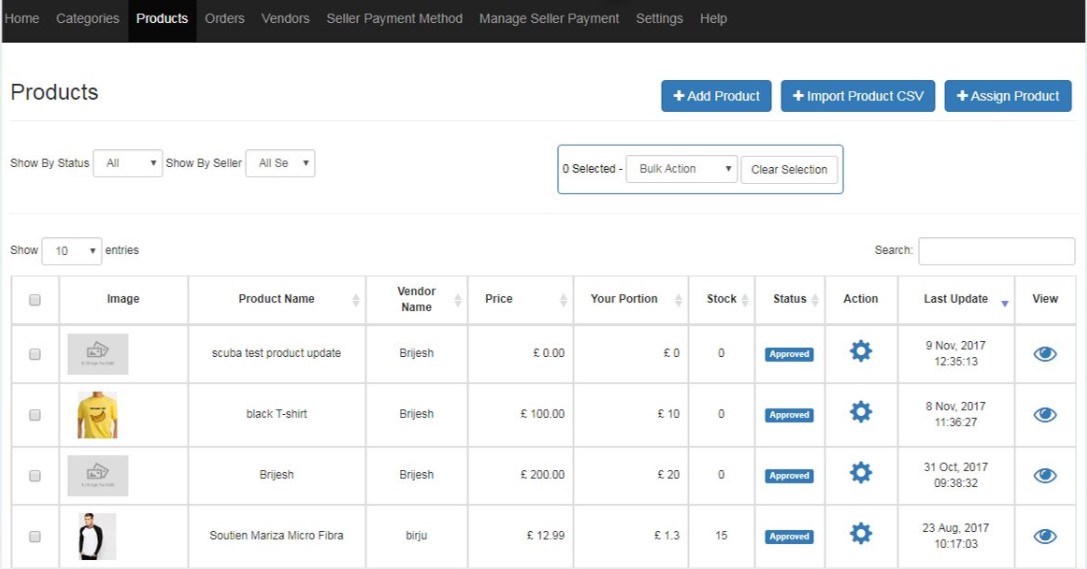
WooCommerce

Now, let’s explore the key opportunities WooCommerce provides in the sphere of online marketplaces.
It seems that WebKul expands its influence on all the biggest e-commerce platforms. The company offers the Multi Vendor Marketplace plugin for WooCommerce. The tool converts a WordPress WooCommerce website into a multi-vendor storefront with separate catalogs and individual order management workflows per seller.
The Multi Vendor Marketplace plugin for WooCommerce delivers a fully functional storefront aimed at multiple sellers who own separate profiles, add unique products, view and edit profile information, and monitor transactions and sales charts dashboard. Besides, the tool displays full order history and enables the communication between sellers and the marketplace owner.
From the primary administrator’s perspective, it is possible to manage product lists, commissions, and other parameters. The core admin can edit/delete vendor-specific products, approve/disapprove sellers and items, set different commission rates for different sellers, assign goods to vendors, turn on/off seller auto-approvals.
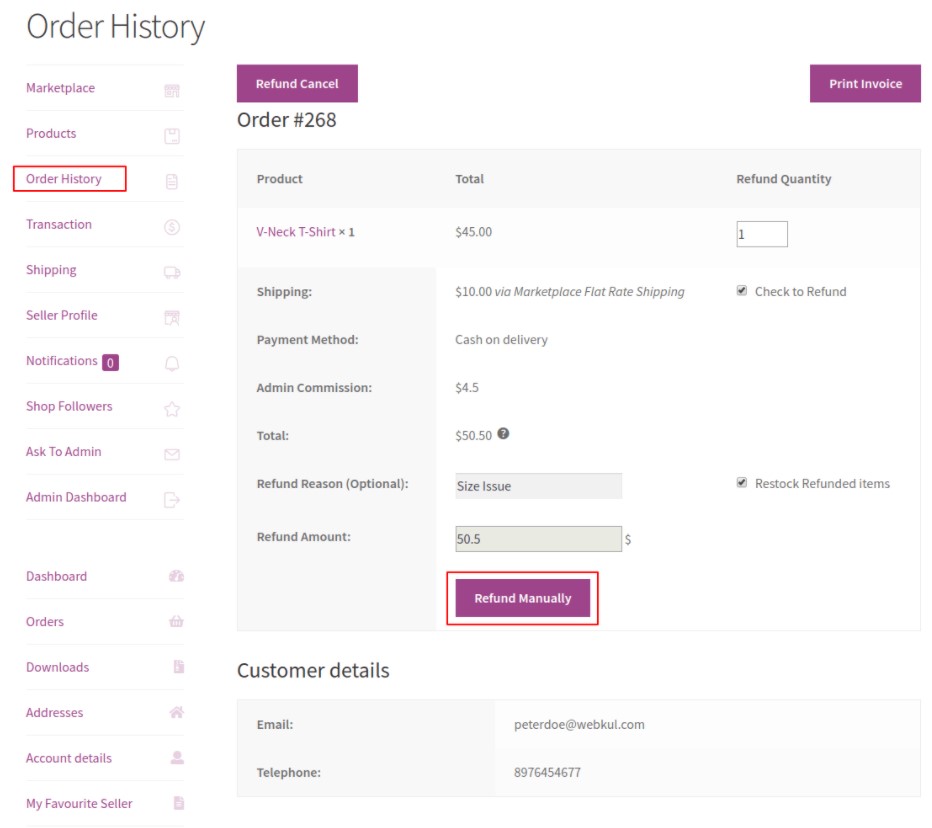
Dokan introduces another opportunity to implement a multi-vendor marketplace based on WordPress and WooCommerce. The plugin lets you create a traditional website with numerous independent stores. As a result, every seller gets their e-commerce storefront with a unique URL, branding, storefront styles, contact details, store location map, etc. Besides, there is a frontend Dashboard for each seller. As for the WordPress admin area, it can be accessed only by the main admin, who has the corresponding rights to do that. Vendors, in turn, manage products, orders, and withdrawals from the frontend.
It is also necessary to mention that the plugin leverages a standard model when it comes to commissions. You can create custom rates per vendor or charge the same percent from everyone.
With the simple product management routine, marketplace vendors can add and edit items right from the frontend. Creating different product types and attributes is another opportunity associated with Dokan. Sellers can also view reports and generate statements from the frontend. Another important nuance is the ability to import data from an external source. For instance, it is possible to automatically transfer products to the WooCommerce marketplace without recreating them manually.
Flexible discounts represented within the module enable vendors to set expiry and restriction for coupons. Besides, they can collect customer reviews.
As for the marketplace administrators, they can control all these and numerous other nuances.
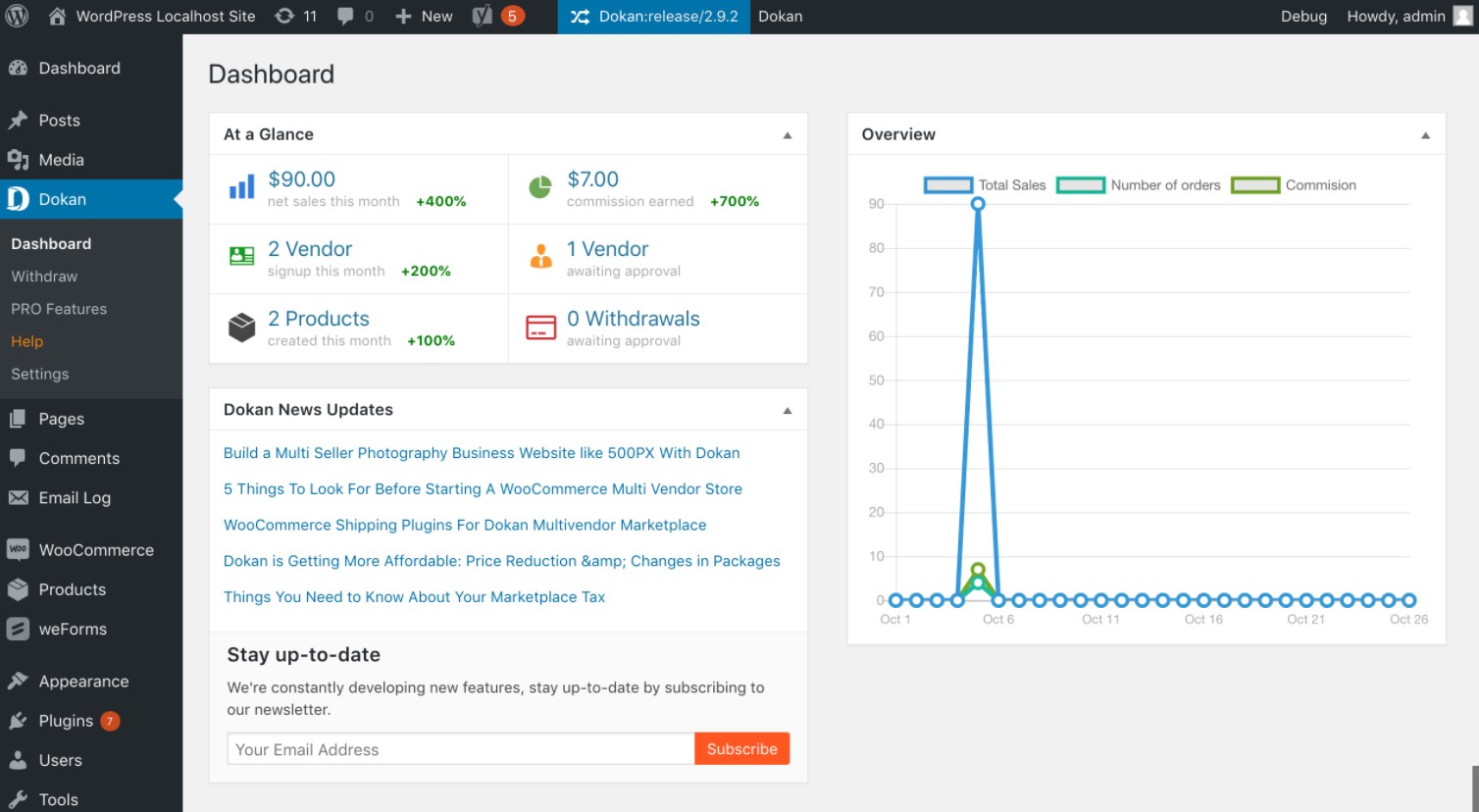
Note that there is also a native solution developed by WooCommerce that delivers the marketplace functionality to the platform’s users. Meet the Product Vendors extension that claims to turn your store into a multi-vendor e-commerce website. With its help, you can create a marketplace to sell anything from physical goods to digital downloads. At the same time, you can continue selling your products with vendor items displayed right alongside yours.
Besides, the extension provides the ability to set custom commission rates across your marketplace. Note that vendors can manage their products and orders.
As the primary administrator, you can keep your finger on the pulse of your marketplace due to an overall view of vendor sales, commissions, and earnings.
Also, check our free import/export tool for Shopify:
(Download for Free)
If you don’t want to deal with e-commerce platforms that should be enhanced with the help of third-party modules and additional customizations, pay heed to the following SaaS solutions focussed on the online marketplace functionality.
With Sharetribe’s marketplace software and platform expertise, you will effortlessly implement any idea of a custom multi-vendor e-commerce website within a single day without writing a line of code. Sharetribe lets you create unique features and experiences on top of powerful APIs. It is possible to configure everything by yourself or with the help of experts.
The marketplace website essentials introduced on the platform include the ability to create vendor profiles and unique catalogs. Besides, users can interact with one another and make online payments. Due to advanced flexibility, vendors can develop stores following their concepts, recreating their brands’ look and feel.
As the primary administrator, you gain full control all over the marketplace. The corresponding admin tools let you monitor and moderate all the activities that take place on your website.
Let’s summarize what we know about Sharetribe:
- The platform offers all essential marketplace features;
- You also get secure online payments;
- Powerful admin tools are under your disposal;
- The platform provides regular updates and new features;
- All participants deal with carefree infrastructure, avoiding numerous headaches;
- The platform provides legal and regulatory compliance;
- You also get maintenance and backups;
- Expert support is available seven days a week.
Kreezalid
Kreezalid introduces another way to connect customers and sellers on an online marketplace website. Just like in the case of the previous solution, you get all the integrated marketplace features and implement them without writing a single line of code. Simultaneously, you can use your design and customize the marketplace to follow your brand requirements.
Feel free to implement any features with or without a team of specialists. The platform’s online marketplace builder delivers such features as vendor-specific stores and catalogs, listing repository, shipping, calendar, product and seller reviews, etc.
Also, note that Kreezalid is a verified partner of Mangopay and Stripe Connect. As a result, all parties related to your marketplace receive an easy and secure way to pay and get payments. At the same time, Kreezalid offers various integrated payment gateways.
Due to the library of plugins, the platform lets you add any necessary features anytime you need them. Grow your business with additional extensions and modules. Besides, you can implement customizations when it comes to the look of your multi-vendor website. Kreezalid offers a free and mobile-friendly template, but you can also choose a premium theme or implement any custom design.
If you face any difficulties, ask for advice. The collaborative community exists around Kreezalid.
You can get help to set up your online marketplace there.
Yo!Kart
Yo!Kart offers customizable, self-hosted, multi-vendor marketplace software for both startups and large organizations. You can use the platform to enter new markets or gain your impact on the one you’ve already occupied. This SaaS solution claims to decrease time-to-market, build competitive advantage, delight, and accelerate your business’s growth.
Yo!Kart delivers tailored shopping experiences for multilingual and multinational audiences via an online marketplace solution and the corresponding mobile apps. The scalable multi-vendor platform works excellent even under peak demand. It can grow with your business, facing any difficulties that may occur during your business journey.
The default marketplace functionality is just the same as we’ve already described: vendors create their storefronts on your website and start selling thor goods, listed in unique product catalogs. Customers visit the marketplace, find products they need, and complete the purchase. You, as a marketplace owner, get the commission. That’s it.
Tiger
Tiger is also among reliable SaaS solutions that help you implement any custom ideas about an online marketplace. The platform lets you create a multi-vendor website and get started in minutes. A fully-loaded marketplace with built-in apps will follow all the most demanding requirements. Another significant benefit is that the technology suite behind the project is astonishingly easy to learn and use. Thus, you get a user-friendly store with apps that deliver a seamless and next-level user experience to vendors and customers.
As for various visual aspects of your marketplace, Tiger delivers customizable themes. Thus, you can implement any digital storefront that follows your brand requirements.
The ability to monitor and manage all processes that take place on the website is also under your disposal.
Also, don’t forget about the exceptional scalability of Tiger. In general, this solution provides all the basic marketplace functionality you need. But you can add customizations whenever you want, or your business case requires.
Arcadier
Another platform that is easy to set up without coding is Arcadier. It introduces a straightforward way to create a feature-rich and highly customizable online marketplace, which is fully hosted. Arcadier lets you implement various marketplace models and customize and scale your multi-vendor website effortlessly, following your business growth.
The platform offers a broad selection of professionally designed themes with an optimized interface. You can begin with a clean and contemporary look and add any customizations as your business grows. Setting up an online marketplace has never been easier.
Furthermore, various powerful tools bring more advanced customizations into the game. You can leverage a homepage layout editor, a full suite of APIs, and custom code editors. Utilize them all to tailor your marketplace according to the ever-growing demands. If this approach seems to be too tech-savvy and complicated, plug-ins and integrations are under your disposal. They let you add new functionalities or design improvements within just a few clicks.
CS-Cart
It seems that CS-Cart is the most sophisticated marketplace solution since it delivers over 500 features. The platform’s default package is enough to launch a project of any complexity. Focus on attracting vendors and selling items instead of wasting your time and money purchasing add-ons and ordering custom development.
The platform’s simplicity lets you create and customize your project’s design with no coding right from the admin panel. CS-Cart offers a responsive design theme with nine fully configurable styles out of the box. Drag and drop blocks, create new elements, add banners, and place various menus, tailoring your virtual shopping mall’s perfect look.
If you want to implement more fundamental changes, pay attention to the fact that CS-Cart offers a 100% open access to the source code. Since no parts are encrypted, you can customize the platform the way you want. And there is detailed documentation to let you apply any changes most efficiently.
Add-ons represent another way to enhance the basic functionality of your online marketplace. More than a thousand modules are already under your disposal, so it is relatively easy to gain new features and improve the existing customer experience.
Spree
As for Spree, this solution also offers various multi-vendor marketplace features. When it comes to different storefront functionalities, a site-wide search and filters, a full vendor list, and vendor product listings are under your disposal. As a buyer, you can add products to cart, change the quantity, remove items, and check out with products from various vendors, making a single payment. As a vendor, you get access to your products, orders, and settings, while a marketplace admin can access everything.
Spree also offers a relatively fast launch. You can open an online marketplace within a few weeks. Get a fully-featured multi-vendor website with an unlimited number of SKUs and vendors without the hell of coding.
With Spree, you will get a mature, market-ready storefront that combines the multi-vendor functionality and scalable architecture and follows industry standards and best practices. No license or transaction costs are hidden in the transparent pricing model. And you will enjoy the ongoing open-source community support!
How to Choose A Platform to Build an Online Marketplace
Since every e-commerce business is unique, there is no single advice on choosing a platform to create a multi-vendor website. However, we prepared several general tips to follow:
- If you already have a storefront on one of the platforms mentioned above, you can easily enhance its functionality with third-party extensions, adding the missing marketplace features. At the same time, you may still sell your products there, as Amazon did.
- If you are new to e-commerce, create a business plan. It will help you calculate the budget that you can spend on a new online marketplace. Besides, you will highlight the functionalities your project requires. Depending on these two parameters, choose a platform.
And note that there is no right or wrong solution to build an online marketplace. Although they vary a lot, each platform is designed to meet specific business needs. You need to understand who your potential sellers and buyers are. Dive deep into the exploration of their needs to figure out what tool will help you satisfy them.
The fact that CS-Cart offers 500+ features doesn’t make it better than the others. It may be more suitable for big companies’ demands that need to provide a more sophisticated user experience. However, smaller players may not need such a variety. A more plain platform will better suit their business model.
Conclusion: The Future of Online Marketplaces
We’ve briefly touched upon the offline past of digital marketplaces, and now it’s time to say a few words about their future. It seems that they are rapidly transforming, gaining wider popularity among both sellers and buyers. The ability to deliver unique, memorable, and reliable personal shopping experiences is the main reason more and more people are bound to multi-vendor websites.
According to the study mentioned , the future of online marketplaces looks bright and promising. Large companies start adopting the marketplace model. As a result, they set trends and standards for multi-vendor websites. Smaller organizations, in their turn, consider digital marketplaces a robust addition to the existing channels. They use more powerful platforms to augment their businesses. This tendency should grow stronger with the popularization of the multi-vendor business model. New and new players will join the market as new marketplaces occur.
The current challenges merchants face on online marketplaces include competitive differentiation, buyer retention/acquisition, and social media engagement. The survey claims that 39% of marketing execs consider differentiating from competitors the most significant challenge. The main reason sellers leave a marketplace is insufficient competitive differentiation. It means that providing extra flexibility for merchants is a must-have feature when you consider a platform to build a multi-vendor website. It is also evident that the depth of per-user customization will grow with the popularization of the marketplace business model.
Other factors that force sellers to leave a multi-vendor website include scarce sales and too high service fees. While everything is evident with the latter, the former depends on numerous aspects. Insufficient sales might be associated with either weakness related to the vendor itself or the drawbacks of a marketplace. However, the latter’s impact will decrease as the business model evolves, providing a better user experience as an industry standard.
What about buyers, you will ask? What are their concerns regarding online marketplaces? The lack of products customers look for is the single biggest reason to leave a marketplace.
Another critical reason to abandon marketplaces is sophisticated logistics. High shipping costs and fees a seller can add due to the considerable distance between the vendor and its customer may confuse potential buyers.
Also, the complicated user experience may dramatically increase the cart abandonment rate on a multi-vendor website. Above, we’ve illustrated a platform that lets you create a marketplace that has a unified cart and checkout page for products purchased from different vendors. If a buyer needs to check out multiple times for a single order (per every seller individually), they won’t probably complete the purchase.
To make the long story short, let’s summarize what we think about the future of online marketplaces:
- They will be more popular among both buyers and sellers;
- They will provide more smooth shopping experience;
- They will be more customizable from the seller perspective.
So, the best platforms to build a multi-vendor e-commerce website are already under your disposal. They offer a relatively robust set of features that may evolve dramatically within the next few years. Considering this fact, solutions that already promise to deliver continuous updates may be more preferable. However, others may adapt to the changing market, providing new features to follow the competitors.
If you already have an e-commerce website and want to migrate it to a Magento 2 marketplace, follow the link below and contact our support – we will definitely help you with that!
Improved Import & Export Magento 2 Extension









